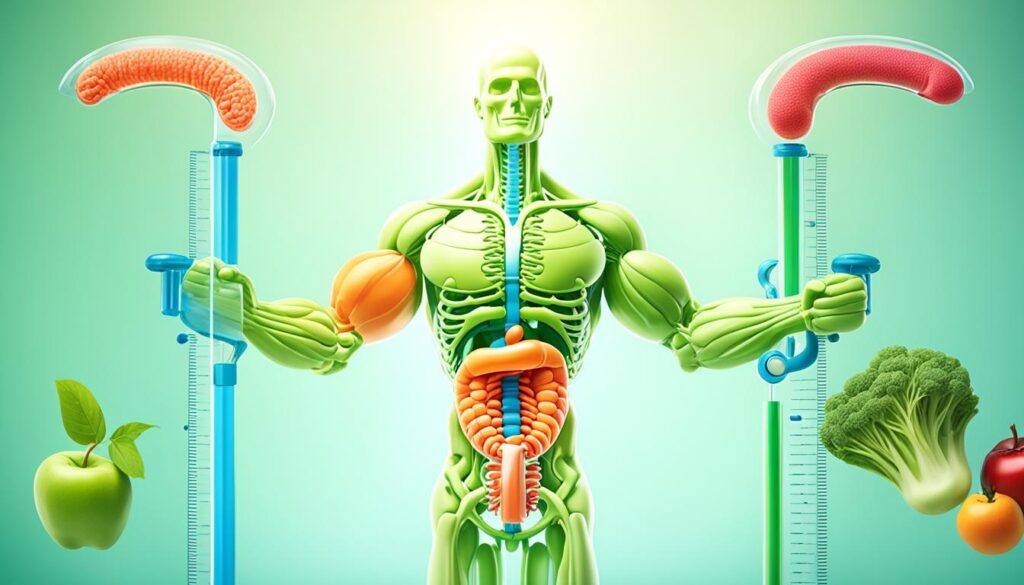Many folks ask about weight loss diet constipation. This worry is valid. Changes in what we eat can change how our stomach works. So, starting a weight loss plan can mess with how often you go to the bathroom.
Not going to the bathroom enough can be a problem. If you have fewer than three poops a week, that’s constipation. Eating less and moving more can slow your poop routine. So, it’s important to watch your gut health when trying to lose weight.
I’ve had my share of tummy troubles. I learned that eating right is key. A good weight loss diet doesn’t have to clog you up. Many plans suggest more fiber and water. This can help keep your bathroom visits regular.
Now, let’s learn about how weight loss and healthy digestion are linked. And, find out ways to help your journey to being fit go smoother.
The Relationship Between Weight Loss and Digestive Health
Losing weight can change how your belly feels. When folks drop some pounds, they might see changes in how often they use the restroom. It’s good to know why this happens and how to make sure it’s not a big deal.
Common Digestive Changes During Weight Loss
Eating less food means there’s less to go out. This might slow down how your body works. It can lead to feeling stuffed up, which experts call low calorie diet constipation. The American Gastroenterological Association says pooping less than three times a week means you’re constipated.
Factors Influencing Bowel Movements
Many things can affect how your gut works when you’re slimming down:
- Fiber intake: You should get about 14 grams of fiber for each 1000 calories. Not enough fiber can make you feel backed up.
- Hydration: Eating less might mean drinking less too. This can lead to being dehydrated, which can also slow things down in your tummy.
- Exercise: Being active can keep your digestion moving smoothly.

The Importance of a Balanced Approach to Weight Loss
It’s possible to lose weight without causing tummy troubles. Eating lots of fruits, veggies, and whole grains keeps your system happy. Drinking plenty of water is a must. And staying active, like taking a 30-minute walk, can really help. By caring for your digestive system, you can feel better and reach your weight loss targets more easily.
Does Weight Loss Cause Constipation: Exploring the Mechanisms
At the start of my weight loss quest, I didn’t predict constipation would be an issue. Yet, many folks wonder, “Does losing weight make you constipated?” The answer’s not straightforward. Weight loss can bring about digestive changes, like constipation, in many ways.
Leaving out meals, especially breakfast, can mess with our natural body clock for digestion. Usually, our mornings prompt the need to go, through the gastrocolic reflex. If we skip this meal, our digestion might not work as planned.
Fast weight loss can make us lose fluids, making stool harder to pass. This happens a lot on diets that cut carbs, changing how our body stores water. Research shows few people keep the weight off long-term, suggesting extreme diets are not for everyone.
Don’t forget about “stress constipation.” Feeling stress because of diet changes can affect our gut. Our stomach does not like stress, which could cause us to feel blocked up.
Lastly, some diets for weight loss might not have enough good things to help us digest better. Making sure our meals have the right amount of fiber and drinking plenty of water is key. Remember, aim to lose weight in a way that’s good for your body overall.
Dietary Factors Contributing to Constipation During Weight Loss
Starting my weight loss journey, constipation was a big surprise. Many people who diet notice this too. Eating habits change a lot when we’re trying to lose weight. This can affect how our digestion works.
Reduced Calorie Intake and Digestion
Eating fewer calories can make our digestion slow. Because we eat less, our body makes less waste. This makes us go to the bathroom less. It can be surprising when we’re so focused on losing weight.

Fiber’s Role in Bowel Movements
During weight loss, eating enough fiber is key. Both types of fiber, soluble and insoluble, help keep us regular. Soluble fiber makes stools softer by absorbing water. Insoluble fiber adds bulk. Eating fruits, veggies, and whole grains is important for our gut health.
Low-Carb Diets and Digestive Health
Low-carb diets can lead to constipation. They may not have enough fiber since some grains and fruits are off-limits. These diets might also lack foods that help us go, like certain vegetables and dairy. Adding magnesium from food or a supplement can bring water to the bowel, making it easier to go.
Knowing about these diet issues can help us make good food choices. Eating a balanced diet and staying hydrated are hugely important. They can keep constipation at bay while we work on losing weight.
Lifestyle Changes and Their Impact on Bowel Function
Changing how I live has a big impact on my digestion, especially during weight loss. Doing things that make me move is good for my gut. I try to be active for 30 minutes each day. Walking and dancing are my favorites.
Handling stress well is very important too. Stress can really mess with my stomach. I’ve noticed that holding in when I need to go makes it harder to go later. Now, I make sure to set aside time each morning for this.
Keeping track of when I go to the bathroom and how my stool looks has been helpful. It helps me see how my eating, moving, and gut health are linked. This info helps me make smart choices to avoid getting constipated from not moving enough or being too stressed.
- Engage in regular physical activity
- Manage stress through relaxation techniques
- Create a consistent bathroom routine
- Track bowel movements and stool consistency
With these changes, my stomach feels a lot better on my weight loss journey. The key is to balance things and understand what your body tells you.
Strategies to Prevent and Manage Constipation While Losing Weight
Losing weight and keeping regular are hard. I eat lots of veggies, fruits, and whole grains. These keep me full and help my stomach work well.
Drinking enough water is key. I drink water equal to my daily calories. If needed, I take a psyllium supplement for more fiber.
Listening to your body is crucial. When I need to go, I go. Stool softeners can also be a help if needed. Be careful of medicine’s side effects, especially with weight loss supplements.
If constipation lasts long or is bad, see a doctor fast. With these tips, I stay on track with my weight loss plan without stomach worries.
